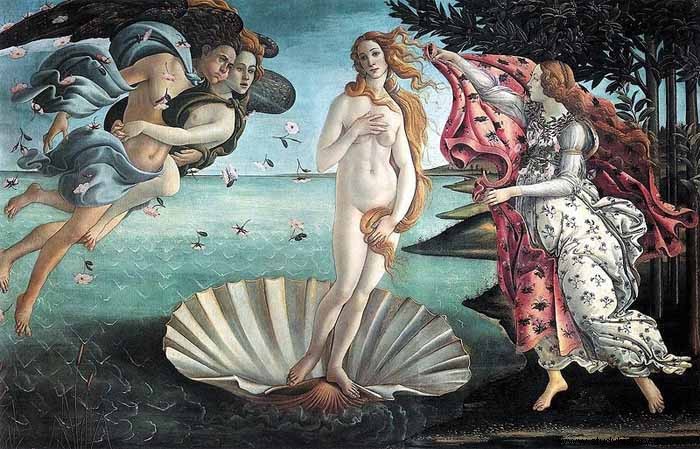April It derives from the Latin verb aperire, which means to open, because in this month is when the land opens, which will later bear its fruits. It is also said that it may derive from the Greek voice aphril , foam, because this month was dedicated to Venus , the Aphrodite (Aphros ) Greek born in Cyprus from the foam of the sea. Jacob Grimm he maintained that the name of the month came from an archaic god of Etruscan times called Aprus .
Second month of the Julian calendar, before the Caesarian reform it had only 29 days. The ancient Romans dedicated this month to Venus, holding great celebrations during the month in honor of Cibeles and Ceres . It was also the month that commemorated the foundation of Rome and at the end of the month the first wine of the previous year was opened with great solemnity.
The day of the Kalendas de Aprilis was consecrated to Venus Verticordia and Fortuna Viril . The women congregated somewhere with running water and burned incense in honor of the two goddesses, seeking their favor. The assistants drank a sacred concoction based on opium poppy, milk and honey.

On the 4th the Megalenses began. , the great festivals in honor of Cibeles. They were very showy and colorful celebrations. The Gauls, the castrated priests of Cibeles, took out in procession that day an image of the seated goddess on a chariot pulled by lions to the sound of cymbals, kettledrums and great shouting. There were theater and banquets in which there was no lack of portions of cheese with fine herbs. On the 10th, the Cibeles festivities concluded with a procession presided over by an image of the Winged Victory.
From the 12th to the 19th the Cerealia was celebrated , the festival of Ceres, inventor of agriculture. White was the color of the goddess, which is why the Romans dressed in immaculate white during these days. The festival ended with a torchlight equestrian procession to bless the crops and flocks in a single act. The day of the Idus de Aprilis, the thirteenth of the month, was dedicated to Jupiter Victor .
On the 15th they were sacrificed to the mother earth goddess, Vesta , thirty pregnant cows to ensure a good harvest. According to Ovid , the origin of this sacrifice came from the times of King Numa . A great sterility shook her reign, the king dreamed that to defeat her he had to sacrifice two cows, but killing only one of them. The nymph Egeria she gave him the solution to the riddle:she sacrifices a pregnant cow.
The 21st was dedicated to the Vestals, perhaps the best-known priestesses of classical antiquity. The priestesses of Vesta were six women of superb beauty, recruited as children to serve the goddess and her estate. They were to maintain their virginity during the thirty years of service. The loss of this entailed death by stoning; on the other hand, letting the goddess's sacred fire burn out, her main task, was punishable by public whipping. The pontiffs were in direct contact with them, since the future of the nation depended on their prophetic predictions.
On the 22nd no sexual acts were performed to guarantee a good harvest.
On the 23rd the Vinalia was celebrated , the feast of Jupiter, protector of the vineyards. This festivity goes back to the legendary times of Aeneas . According to Virgil's Aeneid, his adversary the king of the Rutulians, Turnus , had won the alliance of Mecenio and the Etruscans, offering him half of the must of the next harvest. Aeneas offered the same to Jupiter and was victorious.
The 24th commemorated the birth of Diana and on the 25th that of Apollo
On the 28th the Floralia took place , the festivities in honor of Flora , the ancient archaic Italic divinity of flowers, fruit trees and wine. They lasted until the 3rd of Maius and were wild and licentious parties that were celebrated with even more vigor in the heat of the brothels. The town dressed in colorful colors emulating the incipient spring and the streets were lit up at night to guarantee the safety of the celebrants.
From the 29th to the 30th, the first Vestals took place, celebrated especially by the colleguium (craft guilds) of bakers and oven makers. Donkeys and millstones were also part of these festivals. Decorated with garlands of flowers, they rested with their owners on that special day.
Collaboration of Gabriel Castelló author of Bravery
